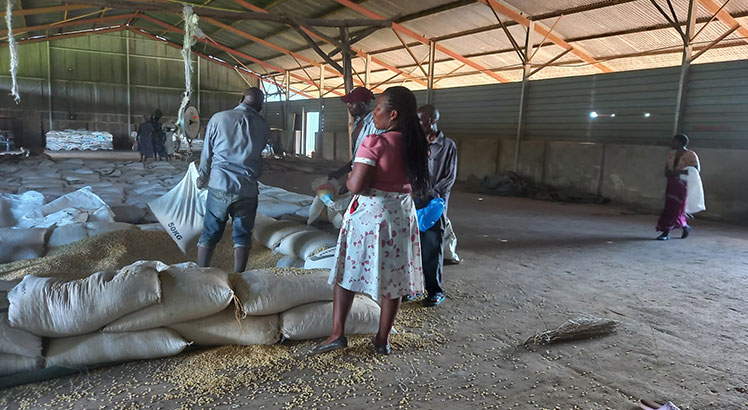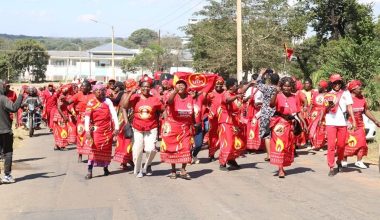Remembering Bishop Zuza

He was named bishop of Mzuzu Diocese on Martyrs’ Day, March 3 1995, and breathed his last 100 years since an uprising staged by the country’s principal martyr—Reverend John Chilembwe.
These are distinguished dates in the life of Episcopal Conference of Malawi (ECM) chairperson Bishop Joseph Zuza, 59, who died att St Johns Hospital on Thursday after a car he was driving overturned at Nthungwa, Mzimba, earlier on the fateful day.
As tributes pour in, Karonga Diocese’s Bishop Mtumbuka and a family member unravelled a double-sided image of the late Bishop Zuza, saying he was naturally quiet and down-to-earth except when faced with the excesses of wrongdoing.
This demystifies the religious leader famed for his August 21 2011 sermon at Comesa Hall, Blantyre, where he candidly confronted the then president Bingu wa Mutharika and his deepening dictatorial tendencies.
Preaching in the face of the fallen leader often remembered for fits of anger and arrogance, Zuza stated: “A person who believes that he or she is perfect is actually the most stupid and foolish person. In Chichewa and Chitumbuka, we call such a person as chisilu or chindere chakufikapo. Do we want to be called as chisilu or chindere?”
Returning to the venue three days later, Bingu warned the man-of-collar would not have come out alive if he had termed the president’s predecessors “the most stupid”.
But Mtumbuka said the spectacle at Comesa was not half the life story of the departed clergyman who has been heading Mzuzu Diocese for 20 years.
“His death is a shock, a great loss really. What he did at Comesa was not typical. He never rushed to confrontational people. He always took his time and usually spoke out when things were getting out of hand,” said the Karonga Diocese head.

The view was echoed by the deceased’s brother, Ferdinand, who said the family was deeply shocked to have lost a parent figure they always looked up to since the death of their parents.
“He was quiet; he was not talkative. However, he was not that quiet when things were going wrong, when the truth was at stake.”
Born on October 2 1955, Zuza was ordained a priest at age 26 on July 25 1982 and he was consecrated bishop at 39 on May 6 1995.
After Principal Consecrator, Archbishop Giuseppe Leanza, had conferred a miter on Zuza, the then president Bakili Muluzi told a packed Mzuzu Stadium that Zuza was a fearless and gallant person who ably stood in as leader of the Catholics in the Northern Region after Monsignor John Roche was unceremoniously deported for allegedly spearheading the release of Living Our Faith, the ground-breaking Pastoral Letter of 1992.
The brains behind the one-party rule of Malawi Congress Party singled out Roche from Ireland for reprisals for reportedly instigating the ECM bishops to rise against founding president Hastings Kamuzu Banda, the bishops’ famous letter shook the heavy door of dictatorship and opened the way for a shift to democracy in June 1993 when Malawians overwhelmingly elected the lamp of multiparty politics.
“The late Zuza was very instrumental in the fight for change,” said Muluzi.
Chancellor College political analyst Dr Boniface Dulani said Zuza was no bootlicker, but a personification of the church’s role as the architect as well as the guardian of democracy.
In an interview, Dulani said: “It might have taken the late bishop a lot of courage to say the things he said in the presence of the president. Most of us tend to harbour critical opinion about others, but we are seldom brave enough to say it in their face.
“The sermon at Comesa stopped Bingu from going too far with his authoritarian tendencies. Then, the president, who had the majority of MPs, was losing popularity outside the National Assembly.”
Zuza might have stood in defence of pluralism, but Mtumbuka, who used to report directly to his fallen counterpart when he was head of St Patricks Seminary in Rumphi, said the deceased should not be remembered as a leader who lashed out at people.
“He was tolerant and understanding,” said Mtumbuka. “He was calm and patient. He was so generous, a good parent who always welcomed everybody at his house and he was always there for us for Karonga Diocese to be what it is today.”
In 2012, Vatican separated Chitipa, Karonga and Rumphi North from Mzuzu Diocese to become a standalone diocese.
The late Zuza was also a father figure in Muhlafuta, Mzimba, where he was coming from when his car overturned after a tyre burst.
According to Ferdinand, the bishop spent an end-of-year holiday in his rural home since December 29 last year.
“We are deeply shocked. Apart from being a bishop, he was a humble man, a father to us. He was always the first to wake up. By the time most of us were awake, he would be in the fields farming or herding cattle. He also loved being with his people, sharing stories and learning from them,” said Ferdinand about the last days with his brother.
The principal of Marymount Secondary School said the departed bishop, a second-born in a family of nine, took charge of family affairs following the death of his father Aristacho Zuza three years ago. His mother died in 2003.
“We all looked up to him and his word was always our guide,” said Ferdinand.
On Friday, the family members had prayers at Marymount where they observed vigil after the death announcement.
On his ill-fated journey from the village, Zuza stopped over at St Teresa Parish in Katete, where he cheered priests.
On Thursday evening, Father Yotam Msumba, who was at Katete, wrote on Facebook: “My dear bishop, my spiritual father, I can hardly understand what you meant yesterday when you said goodbye. In your very words, you said: “Tamukumana ku Katoto [We will meet at Katoto]. Did you mean in this way?”
Zuza will be buried on Monday at Katoto Bishops House.
Minister of Information, Tourism and Culture Kondwani Nakhumwa said government is deeply saddened by the death of the bishop.
Today, the bishop was expected to administer the final vows to a nun of Rosarian Sisters in Mzuzu.





